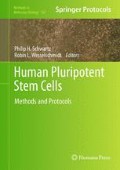Abstract
This chapter will describe the most common immunocytochemical method utilized in the stem cell field – using fluorescently tagged secondary antibodies to detect a primary antibody that is bound to an epitope on a molecule of interest. Secondary antibodies recognize the heavy chain of the primary antibody’s isotype. Generally, these methods employ an incubation period of the sample with the primary antibody, a series of washes to remove unbound primary antibody, a secondary incubation period of the sample with the fluorescently conjugated secondary antibody, followed by washes and preparation for microscopy.
Access this chapter
Tax calculation will be finalised at checkout
Purchases are for personal use only
References
Li, F., Lu, S., Vida, L., Thomson, J.A., and Honig, G.R. (2001) Bone morphogenetic protein 4 induces efficient hematopoietic differentiation of rhesus monkey embryonic stem cells in vitro. Blood 98, 335–342.
Pera, M.F., Filipczyk, A.A., Hawes, S.M., and Laslett, A.L. (2003) Isolation, characterization, and differentiation of human embryonic stem cells. Methods Enzymol. 365, 429–446.
Vallier, L., Reynolds, D., & Pedersen, R.A. (2004) Nodal inhibits differentiation of human embryonic stem cells along the neuroectodermal default pathway. Dev. Biol. 275, 403–421.
Fenderson, B.A., De Miguel, M.P., Pyle, A.D., & Donovan, P.J. (2006) Staining embryonic stem cells using monoclonal antibodies to stage-specific embryonic antigens. Methods Mol. Biol. 325, 207–224.
Draper, J.S., Moore, H.D., Ruban, L.N., Gokhale, P.J., & Andrews, P.W. (2004) Culture and characterization of human embryonic stem cells. Stem Cells Dev. 13, 325–336.
Hoffman, L.M. & Carpenter, M.K. (2005) Characterization and culture of human embryonic stem cells. Nat. Biotechnol. 23, 699–708.
Loring, J.F. & Rao, M.S. (2006) Establishing standards for the characterization of human embryonic stem cell lines. Stem Cells. 24, 145–150.
Ohnuki, M., Takahashi, K., & Yamanaka, S. (2009) Generation and characterization of human induced pluripotent stem cells. Curr. Protoc. Stem Cell Biol. Chapter 4, Unit 4A.2.
Acknowledgments
We gratefully acknowledge intellectual contributions from Lisa A. Flanagan, Richard Pepple, Boback Ziaeian, and Theo Palmer.
Author information
Authors and Affiliations
Corresponding author
Editor information
Editors and Affiliations
Rights and permissions
Copyright information
© 2011 Springer Science+Business Media, LLC
About this protocol
Cite this protocol
Nethercott, H.E., Brick, D.J., Schwartz, P.H. (2011). Immunocytochemical Analysis of Human Pluripotent Stem Cells. In: Schwartz, P., Wesselschmidt, R. (eds) Human Pluripotent Stem Cells. Methods in Molecular Biology, vol 767. Humana Press. https://doi.org/10.1007/978-1-61779-201-4_15
Download citation
DOI: https://doi.org/10.1007/978-1-61779-201-4_15
Published:
Publisher Name: Humana Press
Print ISBN: 978-1-61779-200-7
Online ISBN: 978-1-61779-201-4
eBook Packages: Springer Protocols

